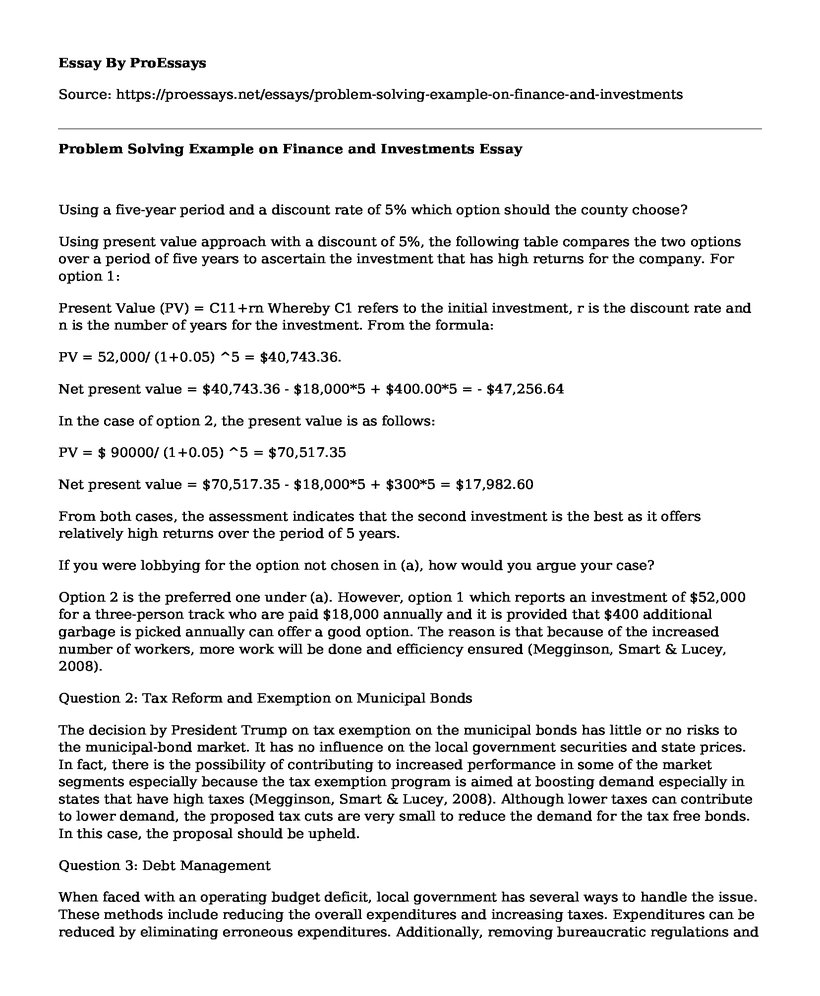Using a five-year period and a discount rate of 5% which option should the county choose?
Using present value approach with a discount of 5%, the following table compares the two options over a period of five years to ascertain the investment that has high returns for the company. For option 1:
Present Value (PV) = C11+rn Whereby C1 refers to the initial investment, r is the discount rate and n is the number of years for the investment. From the formula:
PV = 52,000/ (1+0.05) ^5 = $40,743.36.
Net present value = $40,743.36 - $18,000*5 + $400.00*5 = - $47,256.64
In the case of option 2, the present value is as follows:
PV = $ 90000/ (1+0.05) ^5 = $70,517.35
Net present value = $70,517.35 - $18,000*5 + $300*5 = $17,982.60
From both cases, the assessment indicates that the second investment is the best as it offers relatively high returns over the period of 5 years.
If you were lobbying for the option not chosen in (a), how would you argue your case?
Option 2 is the preferred one under (a). However, option 1 which reports an investment of $52,000 for a three-person track who are paid $18,000 annually and it is provided that $400 additional garbage is picked annually can offer a good option. The reason is that because of the increased number of workers, more work will be done and efficiency ensured (Megginson, Smart & Lucey, 2008).
Question 2: Tax Reform and Exemption on Municipal Bonds
The decision by President Trump on tax exemption on the municipal bonds has little or no risks to the municipal-bond market. It has no influence on the local government securities and state prices. In fact, there is the possibility of contributing to increased performance in some of the market segments especially because the tax exemption program is aimed at boosting demand especially in states that have high taxes (Megginson, Smart & Lucey, 2008). Although lower taxes can contribute to lower demand, the proposed tax cuts are very small to reduce the demand for the tax free bonds. In this case, the proposal should be upheld.
Question 3: Debt Management
When faced with an operating budget deficit, local government has several ways to handle the issue. These methods include reducing the overall expenditures and increasing taxes. Expenditures can be reduced by eliminating erroneous expenditures. Additionally, removing bureaucratic regulations and using a simplified tax regime will improve the confidence of businesses (Johnson and Mikesell, 2003). Long-term debt issuance is not a justifiable approach in this case as it increases future expenditures. Crisis in a local government has negative externalities to the other local government as they usually result in price instabilities. In cases of crisis, therefore, states should intervene to avert the budget deficits by subsidizing the expenditures of the government in the short-term and devising appropriate means of improving tax collection, especially in the long-term to increase the local government revenue size (Johnson and Mikesell, 2003). Expanding the economy also offers the best option in helping restrain the troubled local governments to avoid deficits. An expanded economy ensures increased investment and business performance that increases revenue collection.
References
Johnson, C. L., and J.L.Mikesell. (2003). "The Richmond Unified School District Default: COPs, Bankruptcy, Default, State Intervention, and Epilogue. Public Administration and Public Policy-New York -103 (2003): 733 -746.
Megginson, W., Smart, S. & Lucey, B. (2008). Introduction to Corporate finance. London: Cengage Learning EMEA.
Cite this page
Problem Solving Example on Finance and Investments. (2021, Jun 14). Retrieved from https://proessays.net/essays/problem-solving-example-on-finance-and-investments
If you are the original author of this essay and no longer wish to have it published on the ProEssays website, please click below to request its removal:
- Paper Example on Methods of Accounting
- Planning and Budgeting in Pharmacy Services - Paper Example
- Irrevocable Trust on Gift Tax and Estate Taxes Essay Example
- Paper Example on Cost-Benefit Analysis of MRI Machine Purchase for Clinic
- Maximizing Returns With Minimized Risk: Markowitz Portfolio Theory - Essay Sample
- Essay on European Sovereign Debt Crisis: Financial Crisis of 2007-2008.
- Numbers: An Essential Part of Our Real-World Experience - Essay Sample







